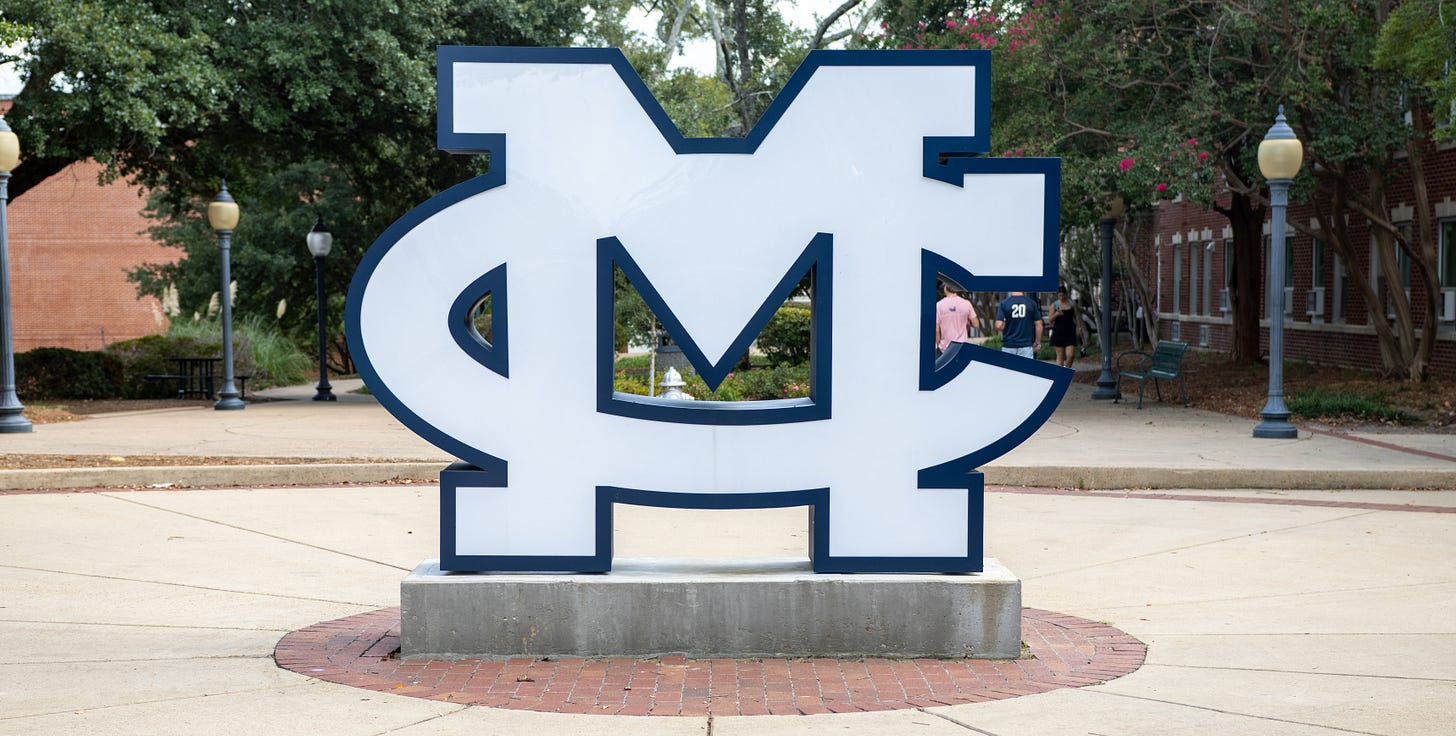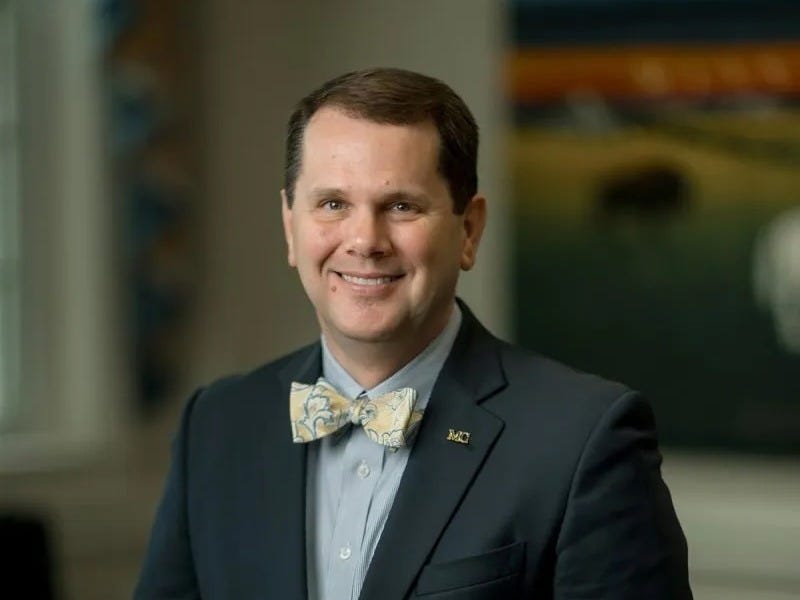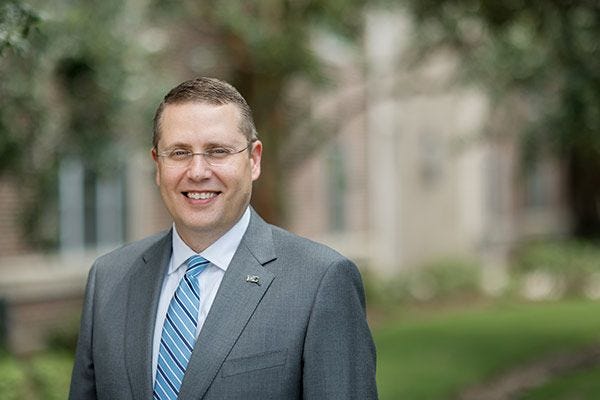MC President & Provost on the Future of University Life
Thompson & Highfield talk football, new names, and academic changes.
EDITOR’S NOTE: some of the material discussed below describes plans for the reorganization of MC’s academic departments which are not finalized. This material includes the names of the reorganized programs, plans regarding the placement of some philosophy coursework, and the potential standalone Christian Studies institute. Any changes not formally announced by Mississippi College on November 18 will not be finalized until Spring 2025, and transition teams composed of leadership within the affected programs are negotiating these details.
The announcement made by Mississippi College officials on Monday afternoon, which brought news of the reshaping of university life at MC, left students, faculty, and staff asking questions about the future of the institution. President Blake Thompson and Provost Michael Highfield want to clear the air.
Thompson and Highfield both sat down with Blue & Gold Media for interviews on Wednesday, November 20 to address hot topics and concerns amongst the MC community. They disclosed the decision-making process behind Monday’s announcements, which included the discontinuation of the football program and the consolidation of several academic programs, and divulged more detailed plans regarding academic restructuring. Those plans, in addition to the consolidation of the School of Christian Studies and the Arts with the School of Humanities and Social Sciences, include:
the consolidation of the Department of Psychology and the Department of Social Work;
the consolidation of the Department of English & Philosophy and the Department of Modern Languages;
the elevation of the Department of Christian Studies to a separate, university-level institute;
and the relocation of some philosophy coursework to the Christian Studies program.
Those changes, Highfield assures, will not be materially impactful to current students. “Generally speaking, the students will actually proceed in their programs without noticing anything different,” Highfield said.
Highfield dispelled several rumors, including that MC’s accreditation, the Speed Scholarship, and several students’ degree programs were at risk. All three will stay intact for the foreseeable future.
Thompson, who became MC’s president in July of 2018, has made numerous changes to the institution in his 7 years as the university’s top administrator. Among those changes were the installation of the Honors College, the opening of the Gore Arts Complex, and the inception of the Speed Scholarship program, as well as many other expansions to MC’s programs and facilities.
Highfield is an even newer addition to the MC’s senior administrative council. After serving 18 years at Mississippi State University, he joined Mississippi College in 2023, now serving as Provost and Executive Vice President, Dean of the Graduate School, and a Professor of Finance. He will oversee the finalization of details concerning the university’s forthcoming academic restructuring.
Below are full transcripts of their interviews. Some quotes have been slightly condensed and edited for clarity.
MC President, Dr. Blake Thompson
Walk me through the events of Monday morning, which I know involved a lot of decisions and communications. Tell me about the conversations that you had.
We started with a Board of Trustees meeting that lasted all morning. It was a tough meeting, a long meeting. We wrestled with these really hard decisions. In the end, the trustees voted really to make some big, hard decisions in the long term interests of Mississippi College.
How long have those changes finalized on Monday morning been in conversations behind the scenes?
The idea of the name change has been talked about for decades. There have been studies done on the subject from long before I was here. In fact, the trustees knew and were involved in those studies that we’ve done as an institution. Some of them were more recent. The changing college landscape of athletics is a recent thing. Right now, there are court cases being settled that will impact the future of intercollegiate athletics forever – that will change it dramatically. We’re trying to make the best decisions we can based on what we see on the horizon for intercollegiate athletics. Some have been for a long time, and some are very recent.
I’m glad you brought that up, because I know that football has been on the forefront of a lot of students’ minds. The closure of the program, for a lot of people, came out of nowhere. Would you be willing to explain a bit more, as best as you can, the rationale behind that decision?
This was such a hard decision. We struggled with it, wrestled with it, prayed over it. We hurt for those student athletes. They are great kids. I’ve been down on the sideline with them all year. We really do hurt for them; we want to help them and support them. I’m so proud of the way they are handling themselves through this. We do want – and I’ll ask Dr. Highfield, perhaps, to comment – we want to make sure, those that do want to stay at Mississippi College, that we can care for them and support them through the scholarship process, but those that want to continue playing, we want to support them as they transfer, and do everything we can to help them. I know they’re hurting, and we’re hurting for them.
You mentioned this earlier – the idea that the future of intercollegiate athletics at large is changing soon. At the faculty meeting and in previous quotes that have been released, NIL and things of that nature have factored into the conversation. Tell me more about how exactly those things fit in with us here, as a DII school.
We’ve tried to look at the overall landscape of college athletics and determine where we stand, and where we want to stand, in that landscape. As far as athletics goes, MC is still a member of the Division II Gulf South Conference. We will continue to pursue excellence in intercollegiate Division II play across 17 sports. As one example of this, our cross country student athletes are competing in the NCAA cross country national championships this weekend in California. And, I also want to mention that we will continue to have band, cheerleading, and dance.
MC Provost & Executive Vice President, Dr. Michael Highfield
Walk me through your experience Monday morning, the kinds of conversations that you’ve been having, and how long those conversations have been going on.
We had a meeting of the Board of Trustees back in September. At the conclusion of that meeting, a task force was established, which was made up of four members of the Board of Trustees who were considered to be experienced and have long been part of the university. In fact, most of them have rotated through multiple terms [on the Board]. Each of them has a long history of helping administer the institution as a member of the Board of Trustees.
Paired with those four Board of Trustees members, the task force also consisted of several administrative officials of the institution, including myself, the controller of the university, the director of budget and accounting, the COO/CFO, the assistant CFO, and the athletic director. That group began meeting in September examining several different facets of the university, looking for operational efficiencies and considering some of the financial challenges that are, of course, always facing institutions of higher learning, and really trying to strategize about the strategic direction of the university for the foreseeable future.
In the end, we presented to the Board of Trustees a series of different options, which they would then consider and vote on at the meeting which was held on November 18. That meeting was a very somber meeting where the task force presented a variety of recommendations to the Board, and the task force was then quizzed by members of the Board about specific issues. The board recessed for 30 minutes to have conversations among themselves regarding the magnitude of the decisions before them. Upon resuming the meeting, the Board proceeded to have more discussion and made their final decisions, which were announced by our Office of Marketing and Communication after the athletic director had met with both the coaches and the team. It was not announced before then to anyone on campus.
Among Monday’s announcements were a lot of changes to MC’s academic programs. Can you walk me through those changes?
The decisions for the academic programs are actually a little bit more noise than substance. For background, Mississippi College currently operates with six different academic schools on the main campus, and then the School of Law, so a total of seven different academic schools. Compared to our peer institutions, some schools are larger and have fewer academic units. Some schools are smaller and have more academic units. It really is what fits best for you as an institution. What occurred to me is that we have an imbalance, if you will, of not only the number of students within each of the schools, but also faculty members within each of the schools. We had to look at efficiencies not only from an athletic side, but also from an academic side.
There are not a whole lot of places on the academic side where we can generate cost efficiencies. We have a large number of students who are enrolled at the institution in a variety of different programs; we need to be able to offer classes for timely degree completion. Administratively, however, we can consolidate, and there are opportunities to do so. Due to past attrition, we have some departments on this campus which have a department chair with a very small number of faculty members, and I think it’s fiscally irresponsible for us to continue to operate in that type of framework.
So, we are consolidating two schools on the main campus into one school. The only reason we haven’t released more definitive information is because I want to give faculty in affected schools the ability to weigh in on what they want to name this new school. Specifically, the School for Christian Studies and the Arts and the School for Humanities and Social Sciences are being combined together. Dean Jonathan Randle, who is the current dean of the School of Humanities and Social Sciences, will return to a full-time faculty position and step out of his administrative role. Dean Stephanie Busbea is currently serving as interim dean of the School for Christian Studies and the Arts, and she will assume responsibility for the new consolidated school.
With that being said, there was a desire by the president and the Board of Trustees, in consultation with the Mississippi Baptist Convention, to elevate the role of Christian studies across the university. As a Christian institution, the Department of Christian Studies is an incredibly important part of the institution – something that binds the school together, especially in regard to the name change. So, we are moving the Department of Christian Studies out of this newly formed school and elevating it to a university-wide institute. Again, some of the names haven’t been fully fleshed out. That’s some of the mechanics we still have to work out.
We are also changing the name of the School of Education to the School of Education and Human Sciences, because it seemed like we were not currently representing the Department of Psychology, nor the Department of Kinesiology, by just calling it a School of Education. Including human sciences in the name gives these disciplines an opportunity to be recognized in the school name.
Finally, we are also going to consolidate some departments across campus. At this point in time, we are only looking to consolidate four departments into two departments. The Department of Social Work, which currently resides in the School of Humanities and Social Sciences, is going to join the new School of Education and Human Sciences and be combined with the Department of Psychology. The other change is the consolidation of the Department of Modern Languages with the Department of English & Philosophy.
The new school will have the Departments of Communication, Music, Art, English & Modern Languages, and History & Political Science.
Just to make sure I’m getting it right – the changes will mostly be administrative?
Yes, the changes are administrative in nature. There is no reduction in force in terms of personnel. Also, at this point in time, there are no changes, nor plans to change, degree programs in these consolidated departments.
That said, we are looking at degree programs across campus. However, I want to be clear: it’s part of our process at all times to evaluate what we’re doing and decide if it’s the best use of resources. There are some majors on the campus that have one student enrolled. It doesn’t make sense as an institution for us to continue in offering some of those majors, but those programs are certainly not part of this reorganization. They will be evaluated, but that is a very long process which goes through the Dean's Council, Academic Council, and President’s Council. It’s a very long process to make any such change.
Again, I want to be fully clear that this academic reorganization does not have any material impact on students. What is printed on a transcript is not changing; these programs are not changing, the course numbers are not changing; advisors are not changing; where faculty are located is not changing. The main difference will be where programs are academically housed. The most significant change for a student is the case of a social work student. Beginning in December 2025, graduates of the social work program will sit with the graduates of the School of Education and Human Sciences during commencement. But nothing major is going to impact the student in any meaningful way. Generally speaking, the students will actually proceed in their programs without noticing anything different. It’s just that when we have a Dean's Council, there will be one dean there representing those schools as opposed to two different deans representing two smaller schools.
I want to also address concerns about accreditation. Let me be clear: There is absolutely zero impact on accreditation. None. The name change, school changes, and any administrative reorganization are akin to changing your address with the postal service. It literally requires us to submit a form to SACSCOC [the Southern Association of Colleges and Schools Commission on Colleges], the accreditation body for the university, and the Council on Social Work Education (CSWE), the accreditation body for the social work program – and that is it. Again, the academic reorganization and the institutional name change has no impact on accreditation; it simply requires a notification. It happens all the time. Most students here are not of age to remember, as I do, the name changes that happened at universities all over. We all know the University of Louisiana Lafayette; it did not used to be that name. We all know the University of Louisiana at Monroe; it did not used to be that name. We all know the University of Memphis; it used to be Memphis State University. Schools change names. Schools are often reorganized from an administrative structure. It happens quite frequently. Again, it has no impact on accreditation.
The other thing I want to mention – these changes will not impact existing students with respect to the Speed Scholarship Program. There are no pending changes to the Speed Scholarship Program besides those that have already been made public: the institution, in the fall of ‘24, required a 20 ACT to be awarded the Speed Scholarship, and in fall of 2025, [the ACT requirement will be] a 22 to be eligible for the Speed Scholarship Program.
The main driver of this change to the Speed Scholarship is a capacity issue. As we began the fall 2024 semester, we basically operated at a 99% capacity in our dorms. It’s a great problem to have, but it is a situation where we have to manage the level of enrollment through the Speed Scholarship Program, because we have more demand than we literally have space. This is an issue that will continue to be examined, but Speed Scholarship Program awards to existing students will not be changed. Students just have to make sure that they continue to maintain the grades and other requirements necessary to keep their scholarship awards.
Again, no changes are taking place to academic scholarships for existing students – whether it be academic scholarships or the Speed Scholarship Program. Students were made an offer, and they will continue to receive that offer. There is a clarification to be made about athletic scholarships, which is that athletic scholarships operate year-to-year. That is a standard practice in NCAA Division II programs. We are honoring all athletic scholarships affiliated with the football program through May, and we’ve also made the promise that football student athletes who will be within one year of graduation come May, meaning that they are seniors and they want to stay here and finish, that we will continue to provide them scholarship support in addition to the academic scholarships that they already have. Other athletic programs will see no changes to their scholarship awards.
Edited on November 24 for clarity and accuracy. Several statements in the original article implied that all philosophy coursework would be relocated from the Department of English & Philosophy to the Christian Studies program. In fact, the relocation of only one course is being discussed.





